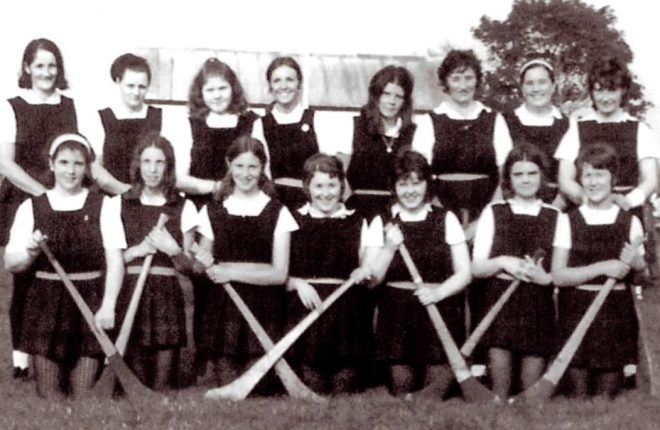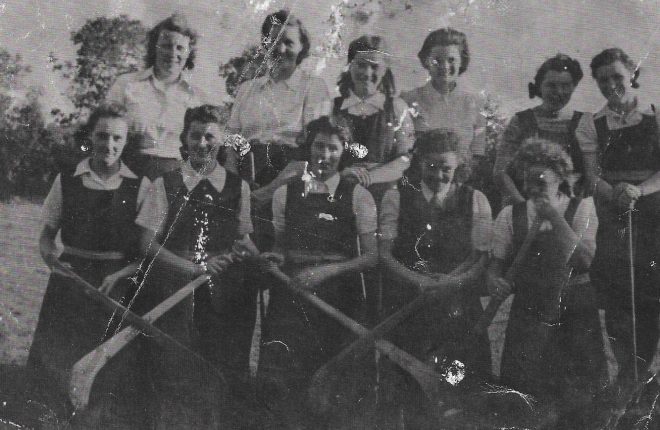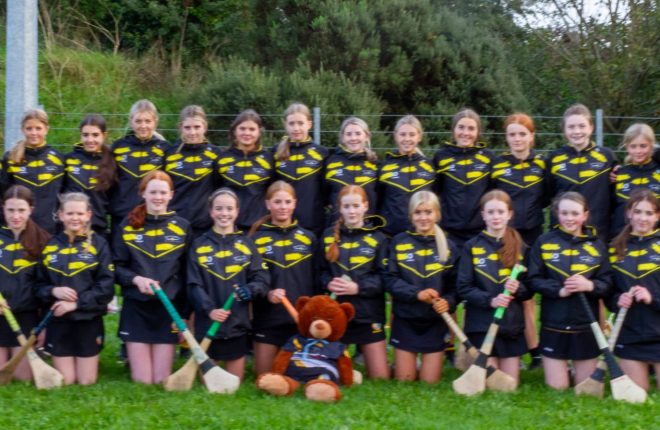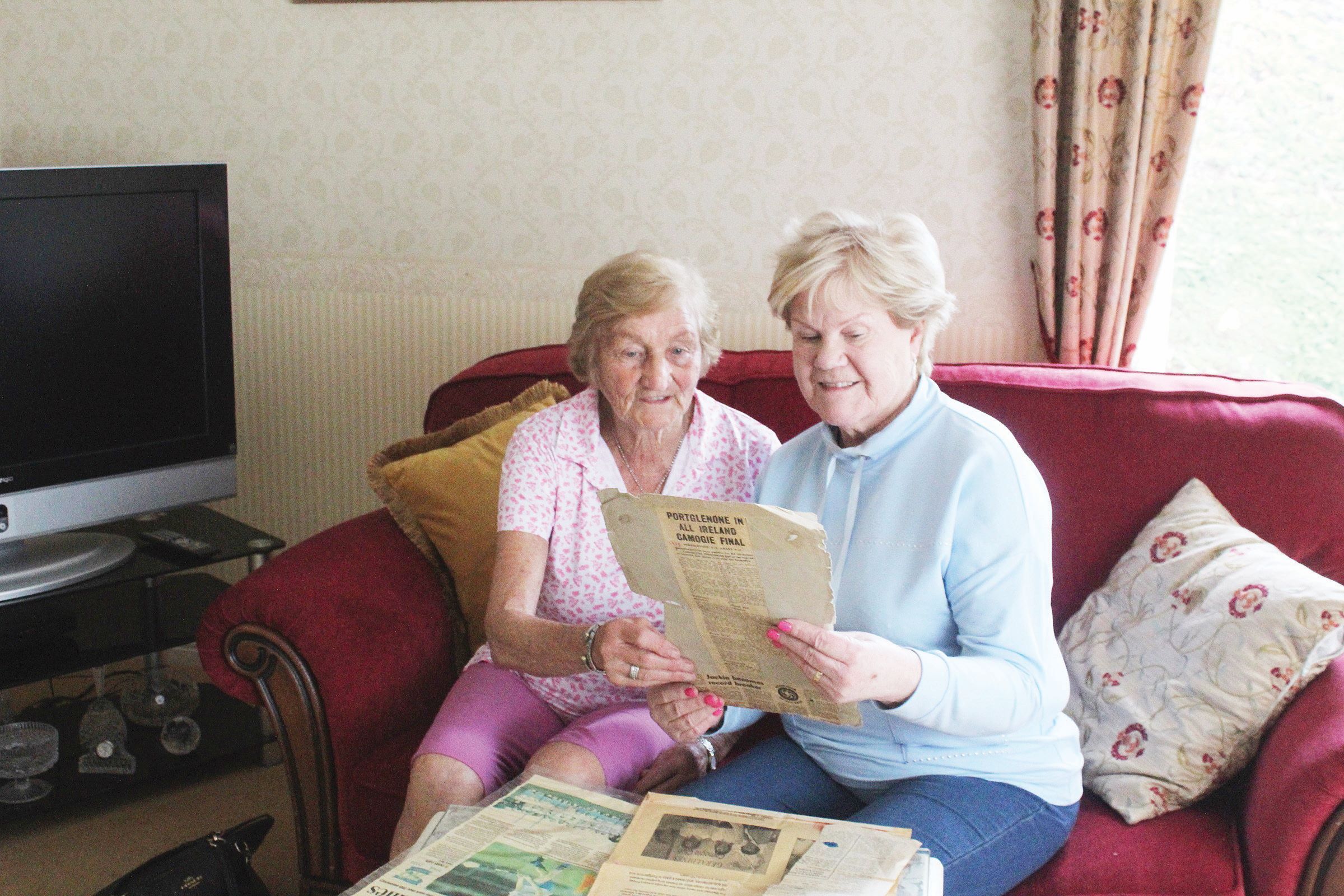It’s 80 years since the early shoots of camogie in Portglenone Geraldines. Stalwart Maire Doherty is the current President while Mairead Magill was involved in 10 of their senior winning teams. They sat down with Michael McMullan to delve into the memories.
THE cups of tea keep coming. It’s a Friday afternoon. The Doherty kitchen table in Lisnahunshin is planet camogie.
Out back, the family woodshavings operation is in full flow. Lorries getting loaded. A hub ahead of the weekend calm.
Inside, camogie chat warms with every minute.
Mairead Magill’s (née McAtamney) love of the game is evident. Her words dance. Maire Doherty (née Kelly) fires out nuggets of history like confetti.
You’d squeeze what they don’t know about Geraldines camogie onto the back of a postage stamp.
It’s no ordinary Friday. It’s just eight days out from the club’s gala celebration and the committee have ticked most things off their list.
Now, it’s nostalgia time. Maire produces the club’s first minutes’ book. Crumpled and dull, yet totally golden. The neat, joined handwriting tells of the days long before Saturday’s glitz and red carpet of the Wild Duck.
But there has to be a beginning. Back in 1944, the 23 or 24 interested players are enough to turn thoughts of camogie into reality.
There was the debate over where they’d play their games. The Largy and ‘Hunshin parts of the parish eventually agreed on their current home on the Gortgole road.
The Casements football club was already four years old.
Sarah McIlvenna (née O’Neill) was the earliest county player, part of two Antrim All-Ireland wins in the forties, and was on the club’s first team.
Camogie waned but never vanished. With the help of games at the annual sports day and across the Bann in Greenlough, the flame flickered before a refocus in the mid-fifties.
By the end of the decade, Mairead can recall taking the early steps of her decorated 32-year career.
There was a Junior title in 1960. A platform. There was plenty of talent and enough for the club to spread its wings.
Some of the early challenges were what comes natural now. Communication and getting the word out wasn’t instantaneous before phones and messaging groups. The landscape has changed.
Our interview was recorded for a feature edition of the Gaelic Lives podcast.
Maire’s daughter in law Orlagh peeks in to record some snippets for the club’s social media. Another box ticked for Saturday’s gala.
The club still await their 12th senior championship and a first since 1992 but there is a vibrant air of progress.
Back to the fifties. While the club began to leave a permanent imprint, Mairead McAtamney was boarding at Portstewart’s Dominican Convent. The PE teacher’s paper thin knowledge of camogie left netball as the sport of choice.
“So some of the girls had to take the camogie,” she recalls.
Back in Portglenone, the game was continuing to grow. It would take time, but a golden period was on the horizon.
—————-
A first senior championship would arrive in 1971. Before a ball was pucked that season, there was a change at the top. Not yet 30, Mairead was coerced into taking over as chairperson. Sue McCormick said it was her time to shine.
“Apart from Sue, you were the oldest there,” Maire jokes.
“I suppose I was the auld doll,” Mairead laughs back. She also coached the team. “I loved it, I absolutely loved it.”
Before the days of catch nets, Magill would count out the half a dozen sliotars before training. Players would sift through the nettles until every ball was returned.
It was the beginning of a spell of dominance that brought nine senior titles in 13 seasons.
“In 1971, we won that senior championship, it was really the tide that lifted all the boats because we took off then,” Maire said.
Before that, the now defunct Deirdre club were cleaning up. Neighbours Ahoghill were winners in 1969. It was Creggan after that.
The semi-final stage was Portglenone’s glass ceiling but Deirdre were an aging team with Nancy Murray still on board. She doubled up as county chairperson and would present the O’Duffy Cup to Portglenone after playing against them in the 1971 final.
When the Geraldines’ time came, it wasn’t by chance. There was the core of minor players coming into the fold.
“We had four or five 15 or 16 year olds on the team,” Doherty said.
“We did have great minors then,” Magill adds. “We won six minor championships in a row. If you couldn’t get a good team out of that, there’s something wrong.
“Bronagh (McIlvenna) and ‘Stockie’ (Margaret Stockman) and Anne McGarry. They lifted the ball and they were flyers, they were brilliant. The then Jackie and Siobhan (McAtamney),” Magill said of her nieces.
Doherty agrees. The work had been put in and the players were topping it up with school action.
Winning the first title is always special. It stands out from the rest. For Portglenone, 1971 was the breakthrough.
“I remember we got to McNaughton’s for a drink,” Doherty recalls of winning their first championship. That was the first time I ever took drink, I was 18 and it was rotten.”
Then it was back home, a bite to eat before a night of celebration at a céilí in the GAA hall.

BREAKING NEW GROUND…The first Portglenone senior winning team in 1971
“You see, before we played any matches, we always went to the monastery to get blessed, the big matches,” Magill said of the ritual.
“We always had a poster up to drop to say ‘win, lose or draw, there’s a hooley in the hall’. We knew rightly, we felt that we were going to win.”
Fr Norbert would host mass for the team on the morning. Many of the monks were from hurling pockets in the south and always kept an eye on the local camogie scene.
“I remember my father was going into Dr Bailey,” Doherty added. “Dr Bailey was saying to him how the camogs are doing great and how they’d put Portglenone on the map.”
There was a genuine buzz and a togetherness of team focus around the families in the parish.
“Everybody just loved camogie,” Magill added of an era that also yielded eight Ulster titles.
On the national stage, they ran All-Ireland champions Austin Stacks close in the 1973 final but found Athenry’s eye for goal too potent in their other final appearance five years later.
In Ulster there were great rivalries built up with an all-conquering Swatragh team and Tyrone side Eglish.
“We had some great games with Swatragh,” Doherty remembers. “Sarannie (McNicholl née Quinn) was a great player. I just discovered that Sarannie’s sister (Bernie) used to mark me,” Magill added.
“She was great at marking, I think they put her on me for that and I didn’t discover until lately that she’s the mother of Brendan Rogers. Now, she couldn’t run as fast as him, but she could mark.”
“The other big rivalry was Eglish,” Doherty added before reciting the Daly sisters – Ursula, Maureen and Catherine.
The mention of Eglish and Magill’s memory bank zones in on one of the Ulster games of that era when her sister Teresa feinted before the game. Dan McKee went to the car for a bottle of ‘water’.
“We gave her a slug of it and she’d come round,” Magill added. “And, you know, I think she played like a demon. We were saying to Dan, asking if it was holy water in that bottle but he said it was poitín, and she was a teetotaller.”
—————-
For all the success, 1979 tops it all. Portglenone won the minor, senior and junior championships all in one day.
Doherty bagged two goals in the junior success, Magill, who would captain Antrim to the senior All-Ireland that season, hit three points in the senior final. It was a busy day for Bronagh McIlvenna and Jackie McAtamney who played in all three finals.
“That was our best year ever,” Doherty said without hesitation. “In ‘83 or ‘84, we won the three as well but they were all on different days.”
It was the first of two three in a row successes with Creggan pipping Portglenone in the middle year, 1980.
“I was in the hospital having Sean,” Doherty recalls. “You were pregnant with Stephen and you came in to visit me.
“You were giving out because they should have won the game and they didn’t it was the one that got away.”
1979 was also special with the club having five members, including Magill as captain, on Antrim’s sixth and last All-Ireland winning team.
“It was an absolute honour for us to have five on a county panel,” Doherty said.
“Jackie and Siobhan were my two nieces,” Magill added. “The other two were Ann Marie (O’Neill) and Susan (Dillon).
“It was a big honour to have five players from the same club on the county team, it was absolutely brilliant.”
The scene was much different to now. Rather than the split season, everything was intertwined. Club games continued. County training was Monday. It was in with the club on a Tuesday with another county session on a Thursday.
“There was no holding back,” Doherty said. “We played all season and never cancelled a match. There were no disruptions whatsoever.”

IN THE BEGINNING…One if the first Geralines teams from 1945
If injuries came they came.
“I think it’s the heavy training now,” Magill said of the increased level of injuries.
“The game has changed completely. At that time, you hit a big long ball out to the corner-forwards and they did the work.
“Now, it’s like the football. It’s all running now, hand-passing and moving into space.”
Doherty accepts it but highlights the manicured pitches now. Back in the day, the grass was long in days when even tractors weren’t always available.
“We had a match on a Tuesday night and the grass was long” she recalls. “Henry John McGarry hooked the mower onto the tow bar of the car.
“I think it was a wee Anglia he had and the car went up and down and up and down, the pitch just wasn’t as level as it was then.”
She speaks of Willie Higgins coming down with a line to mark the pitch and how, if there was no lime, the lines were often marked out with a bag of flour.
“We had a great committee,” Magill adds. “We got to all the carnivals and it was your way of life. That was your social thing and we all got on really well together.
“We got plenty of matches in the carnivals and everybody got their chance and I think that that added to it”
With the tea and chat flowing, stories continued of Hugh Reid’s van trucking them to games and the craic along the way. A yellow club bus came on the scene. It was great when it was in working order.
“Quite often it broke down and let you down,” Doherty said. “So you had to thumb a lift home when it broke down.”
—————-
When Teresa McAtamney moved to Wexford, it gave the Geraldines club the perfect destination for away trips.
At Easter, they’d truck off Caim, outside Enniscorthy, where they’d be hosted by Duffry Rovers.
“We played games and we socialised the whole weekend,” Doherty explained of another example of how close the team became.
Everything changed in 1977 when Teresa was tragically killed in a road accident in Dublin.
“This was probably the darkest day for me in our club,” Doherty said.
“We were county champions and I was pregnant with Carla and they were going to Loughgiel to play a friendly.
“We lived in the Largy area and my sister Anne got on the bus first and they went up to pick up Mairead.”
By that time, the news had filtered through.
“Mairead’s sister Teresa, who had played for us and was our club secretary for so long, was killed in a road traffic accident,” Doherty continued.
“It just was horrendous. There was no such thing as Mairéad getting into a car and going straight down.”
She left behind three children including Siobhan who would go on to become club secretary.
“They have a shield now in memory of Teresa,” Mairead quietly said with pride. Her name will never be forgotten.
“From 1979 the shield is given out every year to the club player of the year,” Doherty added.
Portglenone were champions in 1988 with ’92 being their last title.
There were three final appearances in a row at the start of the last decade but Rossa were in their pomp and Loughgiel were beginning their climb.
It’s the story of sport. Teams have cycles. Portglenone had theirs.

GENERATION GAME…Maire Doherty’s daughter Carla (McGrogan), front left, pictured with last season’s u-16 team
“I remember going down (to the pitch) every year,” Doherty said. “I couldn’t believe the talent that was there. Maybe we took our foot off the pedal, I don’t know, but it dried up for a good while.
“You have to still keep going when it’s not going so well, that’s when you really have to keep going,” Doherty insists, often finding herself looking after numerous underage teams and landing a hand with the seniors.
“We are creeping our way back,” she adds. “We have great underage structures and we will be back. I don’t know whether I’ll be here to see it or not.”
Magill’s love of coaching continues.
The tone of her voice doesn’t lie. After gracing the fields of Ulster and beyond, giving something back wasn’t a chore. It was a love.
Doherty often dreamed of playing for Antrim. But it didn’t arrive. At the end of her playing days, her link with Portglenone didn’t end.
Off the field, she was the glue that helped keep the club on the ground. A bridge from the glory days to now and seeing the young players now out coaching the next generation.
They like what they see.
This week will be about getting glammed up for the club’s 80th birthday. They are content. The club is in a healthy state. The baton has been passed on.
Check out this week’s Gaelic Lives podcast for the full interview with Maire and Mairead ahead of this weekend’s 80th anniversary celebrations.
Receive quality journalism wherever you are, on any device. Keep up to date from the comfort of your own home with a digital subscription.
Any time | Any place | Anywhere













